Voice over Internet Protocol (VoIP) Providers are becoming an essential tool in nowadays fast-paced business world, since they provide a cost effective flexible solution for businesses to make up for the out-dated traditional phone systems that have become less efficient and more expensive to rely on.
VoIP providers offer a seamless communication that should reflect positively on work efficiency. In this article we will look on the Comparison of the Most Popular Best Business VoIP Providers 2024 and compare their features, prices and quality to help you find the VoIP provider that best meets your needs and budget.
VoIP Providers and How does it Work?
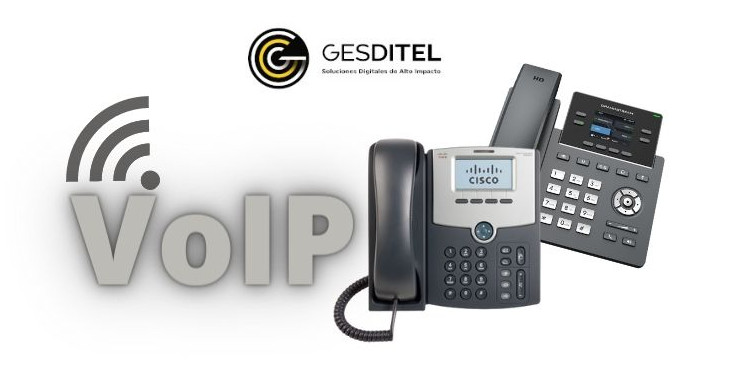
VoIP stands for Voice over Internet Protocol Providers which is a new technology that allows co-workers to communicate together for work or with customers over the internet instead of traditional phone systems (landlines). With VoIP the data collected by the sender are transmitted into digital data packets which then get converted into analog signals so the recipient can understand what is being said.
Since VoIP allows for a more effective use of bandwidth data than traditional phone systems while also offering more useful features for a unified, crash-free conversation, this feature aids company owners in cost reduction and enhanced productivity.
VoIP is used in several applications including customer-oriented services like Skype and Whatsapp as well as enterprise applications like Microsoft team and Cisco VoIP.
What are the Popular Features Offered By VoIP Systems?

You can take advantage of several features that offer more practicality for work owners through VoIP systems, there are features that can be found in all providers regardless of the pricing plan. However additional perks can vary depending on the system provider and the pricing plan.
Here’s a quick overview of the popular features you can get from VoIP systems:-
- Call Forwarding: this feature will allow employees to forward incoming calls to co-worker while they are not available, you can forward the call via VoIP system to another mobile or landline phone number.
- Voicemail: this feature will allow callers to leave their voicemail in case the call was not answered, many of the popular VoIP systems allow visual voicemail services that grants you the possibility to play, delete or save the voicemail.
- Waiting feature: Call waiting is a function that alerts users when they have an incoming call while they are already on a call, giving them the choice to switch between the two calls while waiting.
- Holding Conferences: VoIP systems allow users to hold conferences by either adding participants to an ongoing conference or dialing into a dedicated conference line.
- Caller ID: VoIP systems offer the function to see the caller ID such as number and name before attempting to answer them.
- Video Calls: many VoIP systems offer the possibility to host a voice or video call depending on the user’s needs.
- Auto Attendant: this is a feature that allows callers to receive an automated voice message that directs them to redirect their call to another number or department incase of unavailability.
- Integration: VoIP systems often offer the function to integrate with other applications for messaging to offer a more seamless communication.
What are the Advantages of Using VoIP Systems in Place of Traditional Phone Lines?
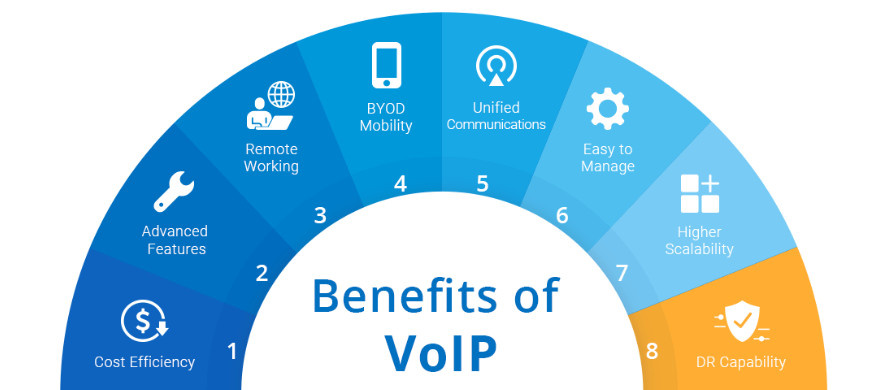
Savings: VoIP services, particularly for long-distance or international calls, can be much less expensive than conventional phone services. Instead of being charged by the minute, VoIP calls are sometimes paid at a fixed cost or according to data use.
Portability: VoIP allows you to carry your phone number with you wherever you go since you can make and receive calls from any location with an internet connection.
Flexibility: VoIP provides a large selection of features and integrations, including call forwarding, voicemail transcription, and video conferencing. Businesses or distant workers may find this flexibility particularly valuable.
Scalability: VoIP systems are an excellent choice for expanding companies or those with variable call volumes since they can quickly scale up or down as needed.
Better call quality: Due to recent improvements in technology and internet bandwidth, VoIP call quality is now frequently on par with or even better than traditional phone lines.
10 Best Business VoIP Providers 2024: Comparison of the Most Popular Tools
Comprehensive study on the VoIP market was undertaken by our own specialists, who then rated the top VoIP service providers based on their features, services, pricing, and customer support. We created the reviews that follow using this unbiased research and testing.
1. RingCentral
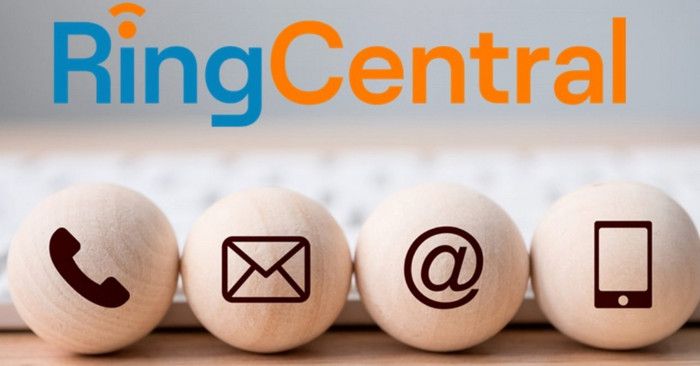
Due to the many functions it provides, RingCentral is unquestionably the best VoIP option for organizations worldwide. RingCentral is a cloud-based platform for communication and integration that offers a range of services and price options to suit your company’s needs. Here is a brief summary of CallCentral’s features and price options:-
Features:
- Voice and video conferencing
- Messaging and team collaboration
- Online faxing
- Business phone numbers
- Call management and routing
- Integrations with other business tools
- Mobile apps
Pricing Plans
- Essentials: with up to 20 users, beginning at $19.99 per user per month. includes 100 toll-free minutes, 4 participants each video meeting, and unlimited calls inside the US and Canada.
- Standard: with up to 100 users, beginning at $27.99 per user each month. includes all features from the Essentials package in addition to unlimited audio and video meetings, 1,000 toll-free minutes, and more administrative controls.
- Premium: with 200 users, beginning at $34.99 per user per month. adds comprehensive analytics, automated call recording, and up to 2,500 toll-free minutes to the list of Standard services.
- Ultimate: with unlimited users, beginning at $49.99 per user each month. Contains all Premium features in addition to device status reports, limitless storage, and connectivity with Salesforce, Zendesk, and other CRM programs.
Pros:
- Capacity to deal with a lot of incoming calls and offer quick customer service
- The capacity to scale up or down in response to changes in call traffic or business requirements.
- Possibility of offering 24-hour customer service, if needed
- Centralizing customer service enquiries and problem-solving can increase efficiency and consistency.
- Having access to call statistics and data, which may be used to spot persistent problems and potential improvement areas.
- In the event that it is required, the ability to provide help in many languages might result in cost savings over employing and training an internal customer care team.
Cons:
- Cost might be a big consideration, especially for startups or small enterprises. Quality of service can also differ based on call center management and training procedures.
- Lack of control over the customer service experience because calls are handled by a third-party provider; Potential for long wait times or frustrating automated menus; Concerns regarding data security and privacy, particularly if sensitive customer information is being shared with a third-party provider; Language barriers or cultural differences may have an impact on the quality of service for some customers.
2. 8×8
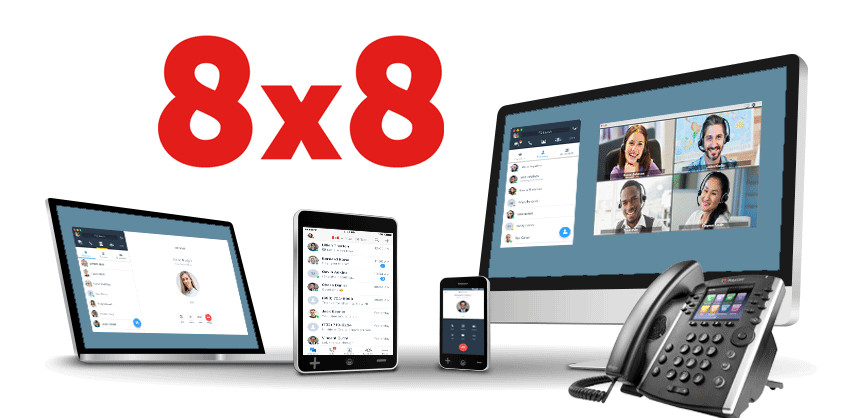
One of the most well-known VoIP platforms, 8×8, is cloud-based, offers a variety of communication and remote collaboration functions, and has price options that are ideal for both small businesses and established organizations. What makes 8×8 unique are as follows:-
Features:-
- Voice and video conferencing.
- Team cooperation and messaging
- Online faxing
- Business phone numbers
- Integrations with other corporate tools
- Call management and routing
- Contact center capabilities
- Mobile apps
- Analytics and reporting
Pricing options:-
- X2: with up to 250 members, beginning at $25 per user per month. includes voicemail, basic analytics, 3-way calling, and unlimited domestic and international calling.
- X4: with up to 250 users, beginning at $45 per user per month. adds comprehensive call management, call recording, and improved analytics to the list of X2 capabilities.
- X6: with up to 250 users, beginning at $110 per user every month. includes all X4 capabilities in addition to dashboard customization and contact center capability.
- X8 offers customized pricing and up to 5000 users. includes all X6 features in addition to individualized technical support.
Pros:
- Voice, video, chat, and collaboration tools are just a few of the many communication services available. A user-friendly UI is also available.
- Cutting-edge call management and routing tools that can help firms enhance their customer care operations.
- Integration with several corporate technologies, such as Salesforce, Microsoft Teams, and G Suite, to facilitate users’ workflow efficiencies.
- A single video conference may accommodate up to 100 people with excellent audio and visual capabilities. Flexible pricing structures that may be adapted to the particular requirements of the company
- Businesses may watch their communication metrics and find areas for development with the use of sophisticated analytics and reporting options.
Cons:
- Cost can be a major consideration, especially for small businesses or startups.
- Some users have reported call quality and dropped calls, though this may be dependent on the network setup and internet connection quality.
- Limited branding and customization options, which may be an issue for businesses that want a more branded experience.
- Extra features could come with extra costs, which add up rapidly and increase the platform’s price beyond what was initially anticipated.
- Businesses who want to engage with more established suppliers may be concerned by the platform’s lack of recognition or established status as compared to some of its rivals.
3. Nextiva
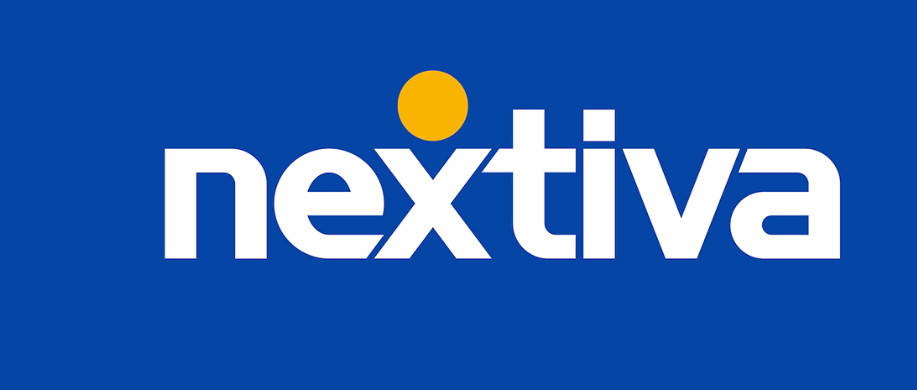
Nextiva is another cloud-based VoIP system that comes in with a variety of useful features that best meet the needs of all scales of businesses in order to improve their communication quality and hence productivity. Some of the key features Nextiva offer are the following:-
Features:-
- Audio and Video Calls: enjoy high quality audio and video calling features offered by Nextiva for web browsers, mobile phones and desktops.
- Instant messaging: Team members may interact in real-time, share files and links, and work together on projects using Nextiva’s platform’s chat function.
- Virtual Conferences: Nextiva comes with a feature that allows users to host online video meetings with up to 200 participants.
- Team Collaboration: Nextiva platform offer a feature that allows coworkers to share calendar, important events, task management steps, and other sharable valued data via Nextiva sharing tools.
- Call Center Features: To assist organizations in managing their customer support operations, Nextiva offers call center capabilities including call routing, call recording, and call analytics.
- Integration with other business products: To assist users in streamlining their processes, Nextiva connects with a variety of business tools, including Salesforce, Microsoft Teams, and G Suite.
Pricing plans:-
Nextiva offers three pricing plans including the following:-
- Basic: this plan offers unlimited calling, voice-to-email and full access to the mobile app for 20$ per month for each user.
- Pro: This plan has the same capabilities as the Basic plan but starts at $25 per user per month and adds sophisticated call management tools like call recording and conference bridge.
- Enterprise: This plan includes all the capabilities of the Pro plan as well as extra features like sophisticated analytics and custom integrations. Pricing is tailored based on the unique demands of the organization.
Pros:
- Many Features: call management, texting, video conferencing, and others, are available with Nextiva.
- Scalability: With adaptable price choices, Nextiva can serve companies of all sizes, from small startups to massive corporations.
- User Friendly: The Nextiva interface is meant to be simple to use and intuitive, with mobile apps for access on the move and customized dashboards.
- Reliability: With a 99.999% uptime SLA, Nextiva ensures almost constant service availability.
- Customer Support:
Cons:
- Although Nextiva’s price options are diverse, they could be expensive when compared to other VoIP service providers.
- Nextiva’s service is widely targeted at companies of all sizes located within the US and Canada, thus for companies with international operations it may not be the best choice.
- Having to sign a contract at the offset of the usage may be considered a disadvantage for users who prefer more flexibility.
- Nextiva offers the possibility to integrate with several work tools yet some essential tools may not be supported which is seen as a disadvantage for some users.
- Nextiva’s service is usually stable and guaranteed. However sometimes some technical issues may emerge which could disturb the service.
4. Vonage
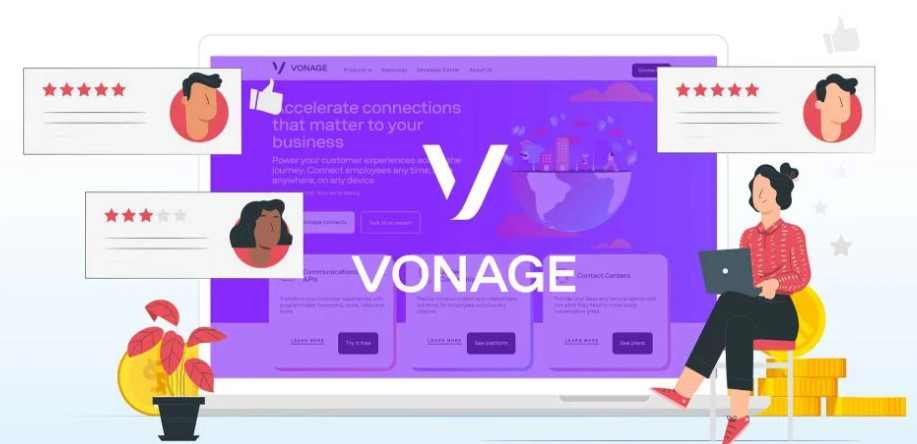
Vonage is another well-known and reputed communication provider that allows za range of communication features suitable for businesses of all sizes, it is a comprehensive cloud-base platform and offers a range of features that include the following:-
Features:-
- Audio calls. Video calls, texting, messaging and other communication solutions.
- You can receive or make calls from desktop computers, smartphones or tablets.
- You can benefit from advantages like call redirection, call recording and auto-attendant.
- The possibility to integrate with widely used CRM and productivity programs like Salesforce, Microsoft team and Google Workspace.
Pricing Plans:
- With Vonage you can freely choose any of the scalable pricing plans offered depending on your use and level of services required.
- Unlimited calling to the US, Canada, and Puerto Rico is included in the least priced plan, which costs $19.99 per user per month. Voicemail transcription is also included.
- The most advanced plan includes capabilities like video conferencing, phone recording, and CRM connectivity and costs $39.99 per user each month.
Cons:
- Some users reported crashing in the service when used in areas with poor internet connectivity.
- Adding extra products and services may be costly.
- Some productivity products may not be supported by Vonage.
- Vonage doesn’t have a free plan subscription.
5. Jive
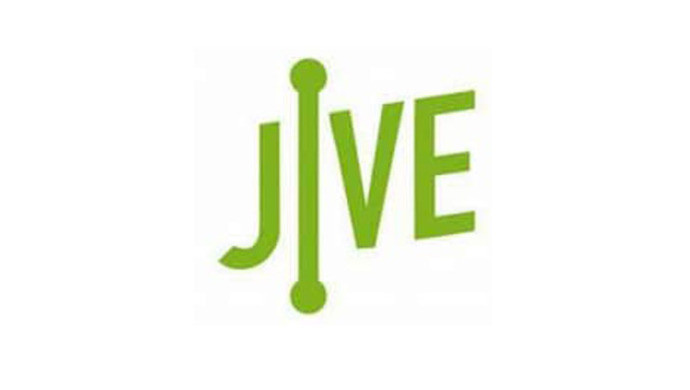
Jive is a cloud-based communication and integration platform found in 2006, since then it has grown to become a market leader for unified communication solutions, it offers a wide range of customizable and scalable features for businesses or all sizes including the following:-
Features:
- A Variety of collaborative tools like voice or video calls, messaging, and the possibility to make or receive calls from any device with the service and steady internet connection.
- Improved productivity and connectivity via the call-routing and auto-attendant features.
- You can record important calls.
- Integration with productivity tools like Microsoft Team, Google Workspace and more CRM productivity applications.
Pricing Plans:
- Basic subscription includes features like voicemail transcription and unlimited calling in the US and Canada and costs $29.95 per user each month.
- Advanced version has capabilities like video conferencing, phone recording, and CRM connections, and it costs $39.95 per person each month.
Pros:
- Voice, Video or Text Conferences.
- Integration with most CRM tools.
- Call Recording, Call Routing and Auto-Attendant.
- Scalable and flexible pricing plans.
- Specialized Plans for larger businesses.
Cons:
- Poor call quality in places with low internet coverage.
- Some extra services and features may be found costly by some users.
- The possibility to link with some of the well-known CRM tools may not be supported by Jive.
- The User Interface may be perceived as complicated by some users.
- No free-plan.
6. Ooma

Ooma is a leading communication platform that is cloud based and offers businesses of all sizes a wide range of features that include:-
Features:
- Phone, text and video conferences.
- The possibility to receive or make calls using any device like desktop computers, smartphones or tablets.
- Call recording, call redirection and auto-attendant.
- Integration with CRM tools like Google Workplace, Microsoft Team and Salesforce.
Pricing Plans:
- Various plans designed to suit your needs and business size.
- The most basic package, which includes voicemail and unlimited calling to the US and Canada, costs $19.95 per user each month.
- The most sophisticated package includes functions like video conferencing, call recording, and virtual fax and costs $24.95 per user each month.
Pros:
- Voice, text and video conferences.
- Integration with CRM and productivity tools.
- Scalable pricing plans to suit all needs.
- Free plan for calling unlimited to the US and Canada.
Cons:
- Some users reported instability in the call quality or dependability or other call problems in places with low internet coverage.
- The price might be perceived as high especially with extra qualities and services.
- Despite the fact that Ooma provides the ability to integrate with various productivity applications, some applications may not be supported.
- The free plan offered by Ooma offers just a few features which may not be suitable for many organizations.
- The user interface may be found challenging by new users who are not familiar with the platform.
7. GrassHopper
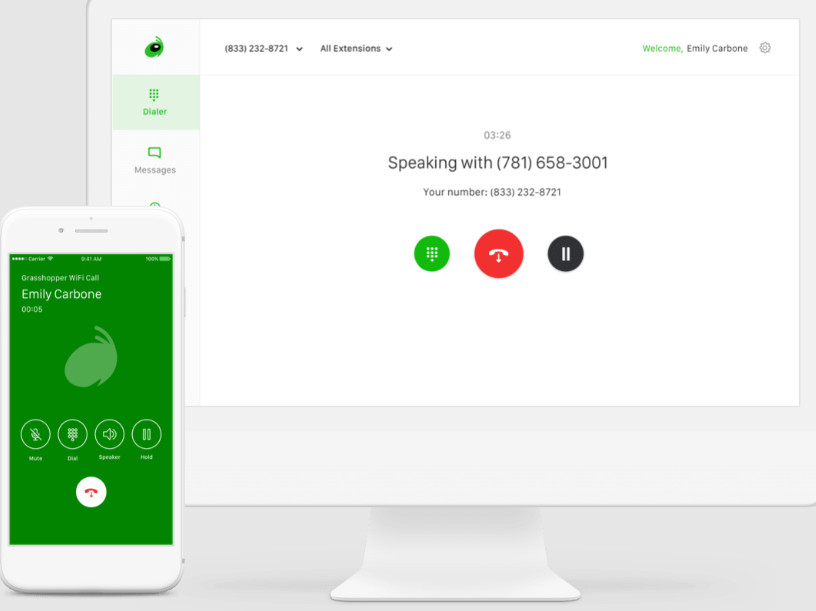
A virtual phone system called Grasshopper provides functions including call forwarding, voicemail transcription, and virtual faxing.
Features:
- Voice, text, video and virtual faxing.
- The possibility to make or receive calls via Grasshopper on any device like desktop computers, smartphones or tablets.
- Call routing, call recording, voice mail transaction, auto-attendant, virtual phone numbers.
- Integration with popular CRM tools like Salesforce, HubSpot and Zapier.
Pricing Plans:
- The most basic package, which includes unlimited minutes, voicemail transcription, and call forwarding, costs $26 per month for one phone line.
- Advanced package includes features like a virtual phone system, call routing, and interfaces with well-known corporate tools, and it costs $80 per month for five phone numbers.
Pros:
- Voice, texting, and virtual faxing are just a few of the communication tools and services that Grasshopper provides.
- Grasshopper offers connectors with well-known business applications like Salesforce, HubSpot, and Zapier, which may improve productivity and optimize workflows.
- Advanced capabilities from Grasshopper, like call routing, voicemail transcription, and virtual phone numbers, can aid companies in more efficient call management.
- Grasshopper offers services that are adaptable to changing company demands and are flexible and scalable.
- Grasshopper provides a free trial so that companies may try out the service before purchasing a package.
Cons:
- Some consumers have reported call quality and reliability issues, particularly when using the service on mobile devices or in locations with patchy network coverage.
- Even though Grasshopper provides a variety of linkages with well-known business tools, some customers can discover that their chosen products are not supported.
- Some customers have complained that the customer service might take a while to answer questions or handle problems.
8. Zoom

Businesses may use a variety of communication tools and services through Zoom, a cloud-based video conferencing and communication platform. Zoom offers a number of VoIP (voice over internet protocol) functions, including phone calling, chat, and screen sharing, while it is most renowned for its video conferencing capabilities.
Features:
- Zoom provides a number of communication tools, such as screen sharing, phone calling, and texting.
- You may use Zoom to make and receive calls from any device, such as a desktop computer, smartphone, or tablet.
- Zoom provides advanced tools including call recording, call forwarding, and virtual backdrops that may improve company communication management.
- Additionally, Zoom offers connections to popular CRM and productivity programs like Salesforce, Microsoft Teams, and Google Workspace.
Pricing Plans:
- Zoom offers a number of alternatives based on the user base and level of functionality required.
- The most basic package is free and includes advantages like unlimited one-on-one sessions and group meetings that run up to 40 minutes.
- Starting at $19.99 per person per month, the most costly option offers services like unlimited meeting time, cloud recording, and webinar assistance.
Zoom also offers customized pricing for larger businesses or those with specific needs.
Pros:
- Zoom provides a wide range of communication tools and services, such as screen sharing, phone calling, video conferencing, and messaging.
- With the aid of connections with well-known corporate applications like Salesforce, Microsoft Teams, and Google Workspace, workflows can be streamlined and productivity may be raised.
- Zoom provides advanced features including call recording, call forwarding, and virtual backdrops that may improve company communication management.
- Zoom offers services that are adaptable to changing company demands and are flexible and scalable.
Cons:
- Some users of the service have reported issues with call quality and reliability while using mobile devices or in areas with poor network coverage.
- Zoom may raise concerns for certain businesses because of past security and privacy issues.
- Zoom has a number of connections with well-known business tools, however some users may find that their preferred solutions are not supported.
- There are limitations in Zoom’s free plan, such a 40-minute meeting time limit, which may not be suitable for many businesses.
- The user interface has drawn criticism from some users for often being confusing or overpowering, especially for those who are not accustomed with the platform.
9. Dialpad
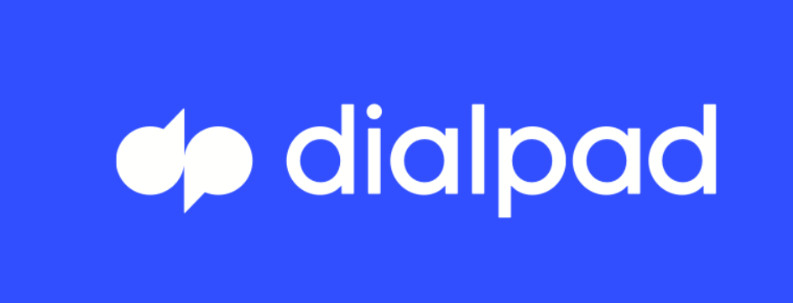
Dialpad is another well-trusted cloud-based communication platform that function on most known operating systems, it offers a wide range of features and pricing plans that fit businesses of all sizes. The platform give you access to all the following features:-
Features:
- Text, voice and video conferences.
- File sharing.
- The ability to make and receive calls from any device with the platform and proper internet connection.
- Auto-attendant, call routing and call recording.
- Regular analytics and reporting on matters like call volume, call durations and other essential metrics for businesses to evaluate their communications.
- The possibility to integrate with a range of CRM and productivity tools like Salesforce, G Suite, Slack.
Pricing Plans:-
Dialpad comes with three main pricing plans that can be easily scaled to your organization’s needs:-
1. Standard: This $15 per user per month package offers audio, video, and messaging features as well as round-the-clock assistance.
2. Pro: This plan has all the capabilities of the Standard plan plus additional analytics and reporting, call recording, interfaces with Salesforce, and other business applications. It costs $25 per user each month.
3. Enterprise: This plan has specialized pricing and all the Pro plan’s capabilities in addition to more extensive APIs, security measures, and specialized support.
10. GoToMeeting
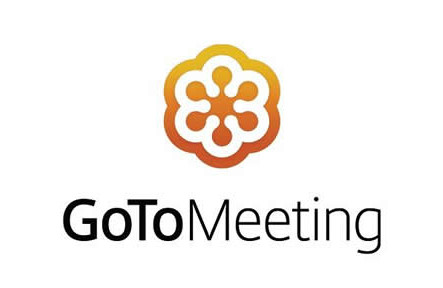
GoToMeeting is a full-features cloud-based communication online platform that offers organizations, businesses and individuals several conferencing and communication tools with scalable pricing plans.
Features:
- Remote conferencing that allows up to 250 participants with audio, video and texting capabilities.
- Participants can share their active screen or a specific window.
- The ability to record meetings for future reference.
- Users can choose one of several virtual backgrounds to appear behind them during meetings.
- GoToMeeting has applications for iOS and Android for users to join meetings using their devices.
- GoToMeeting allows integration with popular CRM tools like Slack, Microsoft Outlook, Google Calendar and more.
Pricing Plans:
1. Professional: This plan accommodates up to 150 attendees each meeting and costs $14 per organizer per month (paid yearly). Screen sharing, sketching tools, keyboard and mouse sharing, recording, and a private meeting space are all included.
2. Business: This plan accommodates up to 250 attendees each meeting and costs $19 per organizer per month (paid yearly). Additionally to limitless cloud recording, transcriptions, note-taking, drawing tools, and keyboard and mouse sharing, it also has all the capabilities of the Professional plan.
3. Enterprise: This plan is meant for bigger enterprises and offers personalized pricing based on the requirements of the firm. Along with dedicated customer success management, onboarding, training, and bespoke branding choices, it has all the features of the Business plan.
FAQ about VoIP Services you Need the Answer for.

Q:What are the Benefits of Using VoIp?
A: VoIP services offer several advantages and flexibility when compared to conventional phone systems, you can easily hold online conferences with large numbers of participants from anywhere with a steady internet connection, it can be a cost-effective solution for businesses and organizations to keep contact with their clients or team members that are unable to attend to a physical meeting, local and international calls using VoIP systems are less costly and more sustainable, and certainly being able to hold video conferences with the functionality to share screen and integrate with other productivity apps.
Q: What Equipment is Needed to Use VoIP?
A high-speed internet connection, a VoIP service provider, a particular VoIP phone, phone software (which enables you to make calls from your computer or mobile device), or an adapter that allows you to use your conventional phone with VoIP are the required equipments in order to utilize VoIP.
Q: Are VoIP Services Reliable?
A: VoIP services can be just as reliable as conventional phone systems. However some factors can affect their quality such as internet connection coverage, in this case most VoIP services offer features like call forwarding and recording so you don’t miss important calls.
Q: What are the Downsides to VoIP ZServices?
A:One potential downside to VoIP services is the poor quality or call crashing in case of internet outage or power outage.
Conclusion
A versatile and affordable replacement for traditional phone services is provided by VoIP services. VoIP service providers are able to deliver cutting-edge features and services that are not accessible with conventional phone lines since they use the internet to carry voice conversations. Even while VoIP has certain potential drawbacks, such as decreased call quality or dependability during internet outages, many users think that the advantages exceed the disadvantages. VoIP is a popular option for organizations and people that want dependable and economical communication services since there are so many providers to pick from and a large selection of plans and features available.

